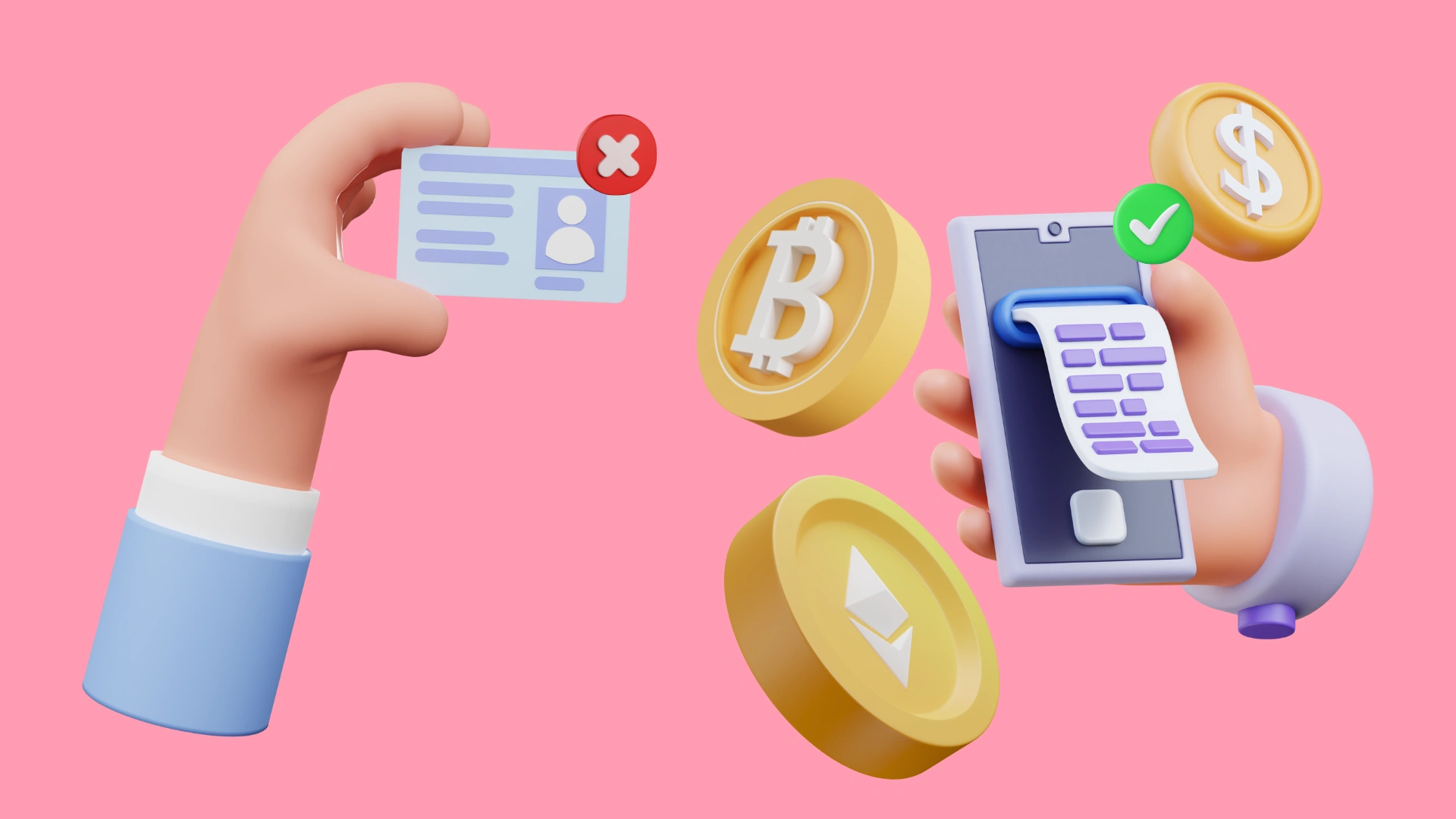15 Best Non KYC Crypto Exchanges in 2025
Each year, the number of reliable and secure no KYC crypto exchanges declines as authorities enforce stricter data collection rules.
Want an easy way to buy crypto without KYC verification? Below is the best platforms to buy, sell, and trade crypto while keeping your identity under wraps in 2025.
What is KYC in crypto?
KYC, short for Know Your Customer, is the legal guideline forcing centralized exchanges to confirm their customers’ identities.
It intends to thwart illicit uses of cryptocurrencies, such as money laundering, tax evasion, and financing unlawful activities.
What are the best no KYC crypto exchanges?

We’ve compiled a selection that blends both centralized and decentralized platforms for anyone looking to buy Bitcoin no KYC or trade crypto assets anonymously.
Keep in mind, though, that once-popular no KYC exchanges like KuCoin, Bitget, and OKX now require verification.
1. MEXC
MEXC is a widely used global exchange that doesn’t mandate KYC at the onset.
Daily, millions engage in spot and peer-to-peer (P2P) trading here, and the platform boasts over 1,600 crypto assets with trading volumes in the hundreds of millions of dollars.
Its offerings span spot, futures, and P2P trading, as well as leveraged ETFs and savings products for earning passive income.
MEXC’s trading fees are among the industry’s lowest, with additional cuts for MXC holders. Although MEXC does feature KYC, it remains optional.
Accounts are grouped into unverified, primary KYC, and verified plus. If you opt for an unverified account, you can withdraw up to 5 BTC per 24-hour period.
Still, new communications from MEXC indicate that many unverified users are being asked to finalize their KYC by June 30, 2024, or move their funds elsewhere.
Furthermore, as of late 2023, MEXC is unavailable to those based in the US. Tempting as it might be, using a VPN to skirt this rule can lead to account suspension and blocked access to your funds.
2. CoinEx
CoinEx is a non KYC crypto exchange that caters to traders across Europe, North America, and Australasia.
It supports more than 600 digital currencies for spot, margin, and futures trading, plus an assortment of earn products and promotional bonuses.
Its tiered fee structure benefits CET token holders, starting at 0.2% for those without CET and going down to 0.1% for large CET balances.
Most appealing for privacy-centric users is that CoinEx does not require obligatory identity checks.
That said, there are withdrawal ceilings primarily connected to your VIP status and CET holdings.
In mid-2023, CoinEx finalized an agreement to end services for new US-based users following a settlement and a ban in New York.
Consequently, US traders might find it tricky to continue using CoinEx without verification.
3. dYdX
dYdX is a partly decentralized exchange specializing in perpetual contracts for over 35 digital currencies.
This platform targets experienced investors comfortable with leveraged trading and derivatives.
If you want advanced options beyond typical trading pairs, dYdX may be a perfect fit, especially since such high-level features are frequently blocked in regions like the US, UK, Canada, and Australia.
To use dYdX, you simply connect a non-custodial wallet, MetaMask, Trust Wallet, Coinbase Wallet, or another WalletConnect-compatible choice.
Because it’s non-custodial, this no KYC crypto exchange requires no personal information; everyone outside dYdX’s restricted areas can begin immediately.
Unfortunately, the US and Canada remain barred from accessing dYdX.
4. Bybit
Bybit ranks among the top five exchanges globally by daily volume, typically exceeding $700 million.
It features more than 400 cryptocurrencies and accepts all major fiat currencies, USD, EUR, GBP, AUD, CAD, for deposits and trading.
Derivatives (futures and options), spot and margin trading, as well as leveraged tokens are all accessible.
Bybit also offers passive income tools, such as interest-bearing accounts, liquidity mining, and ETH 2.0 staking. However, certain features require at least some level of KYC.
There are three user tiers: Non-KYC, Individual KYC Level 1, and Individual KYC Level 2.
Without any KYC, you can withdraw 20,000 USDT daily but won’t be able to use some of the earning products.
Also, at Bybit’s discretion, proof of identity might be required to approve withdrawals.
Bybit does not serve US residents, so employing a VPN may lead to frozen funds and account termination if found to breach its conditions.
5. PrimeXBT
PrimeXBT is a multi-market exchange that, alongside cryptocurrencies, also allows trading in conventional assets like Forex pairs, commodities CFDs, and indices.
Its digital assets selection is narrower than others, focusing on Bitcoin, Ethereum, Litecoin, XRP, and EOS, but it strongly defends user anonymity.
PrimeXBT does not make KYC a prerequisite and clearly affirms its commitment to respecting users’ privacy in trading.
Yet, it reserves the authority to perform identity or source-of-funds checks at any time through a Customer Due Diligence protocol.
6. Bisq
Bisq operates as a decentralized Bitcoin exchange ecosystem, enabling direct user-to-user trades through open-source software.
Transactions remain non-custodial, so Bisq never holds user funds, and all transfers occur through Bisq’s secure, peer-to-peer network underpinned by Tor.
This design aims to prevent personal information from being paired with trading habits, sidestepping risks like data theft or misuse.
On Bisq, you won’t ever be asked for identity documents, and it imposes very few maximum trade sizes.
Users favor this platform for its emphasis on privacy, which aligns seamlessly with its decentralized architecture.
7. HODL HODL
HODL HODL is a peer-to-peer Bitcoin marketplace that doesn’t handle user funds.
Instead, crypto involved in a transaction is placed in a multi-signature escrow, cutting the danger of theft and speeding up the process.
Due to its non-custodial framework, HODL HODL isn’t subject to the rigorous compliance demands often faced by centralized exchanges.
Therefore, it remains a place to buy crypto without KYC requirements, HODL HODL never asks for your personal details.
Because it’s a P2P site, there aren’t typical withdrawal caps, though the number of active offers, contracts, and volume you handle may be subject to certain restrictions.
8. Uniswap
Uniswap is the largest decentralized exchange, holding upwards of $4 billion in total value locked (TVL).
Traders can swiftly buy and sell Ethereum and ERC-20 tokens with minimal slippage, plus access other blockchains such as BNB Chain, Optimism, and Polygon.
Liquidity providers can earn by pooling assets on Uniswap, which relies on automated market maker (AMM) technology.
To start on Uniswap, just link a self-custody wallet, and you’re all set. There’s zero KYC in place, and Uniswap will never request personal information, your trading remains pseudonymous by default.
9. PancakeSwap
PancakeSwap is the most frequented decentralized exchange on BNB Chain, letting users exchange BNB and BEP-20 tokens quickly.
All you need is a non-custodial wallet, like Trust Wallet, containing BNB to handle transaction fees.
In addition to trading, PancakeSwap offers yield farming, staking, liquidity pools, and even a lottery, all integrated within the dex.
As a decentralized platform, it neither holds your funds nor enforces identity checks.
10. SimpleSwap
SimpleSwap acts as an instant-exchange service, featuring over 900 cryptocurrencies and fiat options.
You don’t even need to open an account, just input the trade details, supply your wallet addresses, and confirm.
Because of this structure, there’s no mandatory KYC, making it convenient for people seeking to buy crypto without KYC involvement.
SimpleSwap’s layout is straightforward and beginner-friendly, making it a comfortable alternative to some decentralized platforms that may have a steeper learning curve.
11. Changelly
Changelly is a non-custodial exchange supporting more than 200 crypto assets while providing additional features like margin trading, perpetual futures, and interest-based products.
Using Changelly simply involves hooking up a non-custodial wallet (for example, Exodus, Ledger, or MyEtherWallet), without any enforced identity verification.
Still, Changelly retains the option to ask for details if a transaction is flagged as high-risk.
Additionally, certain trades and services may necessitate KYC if you use Changelly to connect with another service.
For US citizens, Changelly remains out of reach, as they’ve barred stateside operations.
12. TradeOgre
TradeOgre is a centralized platform introduced in 2018, offering more than 120 digital currencies for trading.
Its main appeal lies in its respect for user privacy and its absence of KYC protocols. Privacy coins, especially Monero (XMR), receive substantial support.
Unlike many platforms, TradeOgre’s terms of service do not explicitly exclude US investors, making it uniquely attractive for those seeking anonymity.
13. Pionex
Pionex is well-known for its built-in crypto trading bots, allowing automation strategies on over 330 cryptocurrencies, including leveraged trades.
While KYC is available (with Unverified, Level 1, and Level 2 as tiers), it’s not obligatory for basic access.
An unverified account carries stricter limits, but Level 1 KYC only demands minimal info, your country and name, to permit withdrawals, trading, and fiat deposits within certain bounds.
Some parts of Pionex’s service are accessible for US residents, though margin bots, leveraged grid bots, and leveraged tokens may be disallowed due to regulatory boundaries.
14. ProBit
ProBit is a centralized exchange with more than 400 listed cryptocurrencies for purchase, sale, and trading. Staking, IEOs, and other income possibilities are included as well.
ProBit employs two KYC tiers: Level 1 just needs email confirmation, enabling deposits, trading, staking, and withdrawals up to $5,000.
Level 2 asks for ID verification, raising your withdrawal limit to $500,000 and granting access to IEOs.
ProBit doesn’t explicitly ban US traders in its official statements, but certain products might be off-limits depending on local regulations.
15. OpenPeer
OpenPeer is a decentralized, peer-to-peer marketplace running on EVM-compatible networks like Ethereum, Binance Smart Chain, and Polygon.
By using self-custody wallets (such as MetaMask or Trust Wallet), you retain full control of your assets, which are secured by a smart contract escrow system.
KYC remains optional and is determined mutually by the trading parties through OpenPeer’s decentralized ID feature.
Trading predominantly involves USDT, with more than 100 fiat currencies and payment methods available, though liquidity can be limited for some pairs due to the exchange’s relative novelty.
OpenPeer, by design, never collects users’ personal details and is off-limits for residents of the US and other restricted areas. However, the core on-chain contracts remain permissionless.
Tips to Maximize a Non-KYC Crypto exchange
By combining these tips, you’ll better leverage the benefits of a non KYC crypto exchange, preserve your anonymity, and continue to buy Bitcoin no KYC, while staying under the radar:
- Pick the Right Platform: Assess whether you want fully decentralized, semi-decentralized, or centralized exchanges with optional KYC. Confirm the exchange isn’t banned in your region to avoid sudden account freezes.
- Use Secure Wallets: Rely on reputable non-custodial wallets (e.g., MetaMask, Trust Wallet) to store and manage your crypto. This keeps your private keys—and thus your funds, squarely in your own control.
- Monitor Withdrawal Limits: Familiarize yourself with daily or 24-hour withdrawal caps. Exceeding these limits might trigger a request to verify your identity, which undercuts buy crypto without KYC.
- Watch for Regulatory Updates: Governments often impose fresh guidelines, forcing formerly no KYC exchanges to adopt mandatory verification. Keep abreast of these changes to avoid unwelcome surprises.
- Protect Your Privacy: While a VPN can mask your location, tread cautiously: breaching terms could lead to suspended funds or accounts. Use unique email addresses and strong passwords to minimize data exposure.
- Diversify Your Activity: Explore multiple no KYC crypto exchanges, some might suit quick trades, others might excel in derivatives or yield. Spreading your trades reduces reliance on any single platform, mitigating risks of sudden policy shifts.
- Stay Security-Conscious: Beware of phishing and fake domains, double-check URLs and only download official apps or software. Enable additional security layers, such as two-factor authentication (2FA), whenever possible.
Final Words
By exploring these diverse platforms, from hybrid exchanges to pure P2P services, investors can still find ways to buy Bitcoin no KYC or trade crypto assets via a non KYC crypto exchange.
Just remember that while bypassing verification may preserve anonymity, it also means surrendering certain protections that regulated platforms typically provide.
Always exercise caution and stay informed when opting to trade on a no KYC crypto exchange.
Frequently Asked Questions (FAQs)
Which no-kyc crypto exchange has the lowest fees?
MEXC often gets the nod for rock-bottom fees, especially with their 0% maker fees for spot trading. However, if you’re holding MEXC’s MX token, you might snag discounts on trading fees, which is a sweet bonus.







